must用法详解
must的用法

must的用法must有必须;应当;很可能的意思,那么你知道must的用法吗?下面跟着店铺一起来学习一下,希望对大家的学习有所帮助!must的用法:表示义务、意图或建议:必须,应该I must leave at six today. 我今天必须六点钟离开。
I must write a letter to the head teacher. 我非得给校长写封信不可。
(强烈意图)You must go and see that film——you'd really enjoy it. 你得去看看那部电影,你会真的喜欢它的。
(提建议)表示推测:必定,一定The light is still on, so he must be at home. 灯还是亮的,他一定在家。
The light was out. They must have gone to bed. 灯都熄了,他们必定睡了。
注意:1. must表示推测时的否定式是can't或couldn't(不可能) ,因为must只用于肯定句,语气很强。
2. 若对过去情况的推测用must have加过去分词。
表示主张:硬要,一定要If you must go, at least wait till the rain stops. 如果你坚持要走,至少也要等雨停了再走。
The machine must break down at this busy hour. 正忙的时候机器偏偏坏了。
表示不可避免性:必然要,必定会All men must die. 人总有一死。
“must+be”“must+be+ v -ing”“must+表示状态的动词”可表示现在或一般的情况; “must+have”表示过去的情况; “must+表示动作的动词”表示将来的情况。
must可表示讽刺或抱怨,此时须以you为主语。
must表示客观上不愉快的情况,意为“偏偏”。
情态动词 must的用法
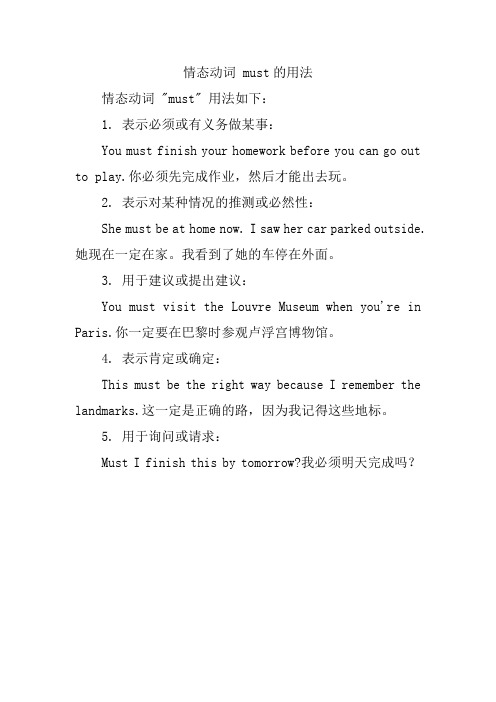
情态动词 must的用法
情态动词 "must" 用法如下:
1. 表示必须或有义务做某事:
You must finish your homework before you can go out to play.你必须先完成作业,然后才能出去玩。
2. 表示对某种情况的推测或必然性:
She must be at home now. I saw her car parked outside.她现在一定在家。
我看到了她的车停在外面。
3. 用于建议或提出建议:
You must visit the Louvre Museum when you're in Paris.你一定要在巴黎时参观卢浮宫博物馆。
4. 表示肯定或确定:
This must be the right way because I remember the landmarks.这一定是正确的路,因为我记得这些地标。
5. 用于询问或请求:
Must I finish this by tomorrow?我必须明天完成吗?。
must的用法
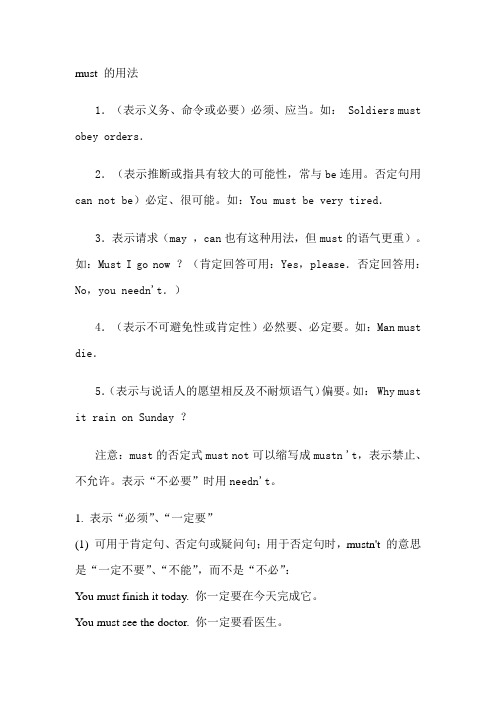
must 的用法1.(表示义务、命令或必要)必须、应当。
如: Soldiers must obey orders.2.(表示推断或指具有较大的可能性,常与be连用。
否定句用can not be)必定、很可能。
如:You must be very tired.3.表示请求(may ,can也有这种用法,但must的语气更重)。
如:Must I go now ?(肯定回答可用:Yes,please.否定回答用:No,you needn't.)4.(表示不可避免性或肯定性)必然要、必定要。
如:Man must die.5.(表示与说话人的愿望相反及不耐烦语气)偏要。
如: Why must it rain on Sunday ?注意:must的否定式must not可以缩写成mustn 't,表示禁止、不允许。
表示“不必要”时用needn't。
1. 表示“必须”、“一定要”(1) 可用于肯定句、否定句或疑问句;用于否定句时,mustn't 的意思是“一定不要”、“不能”,而不是“不必”:You must finish it today. 你一定要在今天完成它。
You must see the doctor. 你一定要看医生。
Must you go so soon? 你一定得这么早就走吗?We mustn't think only of ourselves. 我们可不能只考虑自己。
(2) 主要表示现在或将来,但有时(如在间接引语中)也可表过去(=had to):She asked if she must (had to) leave. 她问她是否一定要离开。
(3) 对于must 开头一般疑问句,若要作否定回答,可用needn't,不用mustn't:"Must I come over tonight?" "No, you needn't." “我今晚必须过来吗?”“不必。
must 用法详解
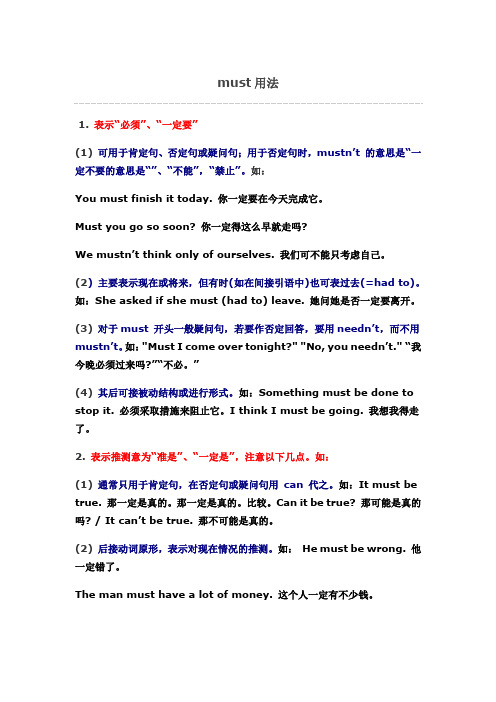
1.表示“必须”、“一定要”(1)可用于肯定句、否定句或疑问句;用于否定句时,mustn’t 的意思是“一定不要的意思是“”、“不能”,“禁止”。
如:You must finish it today. 你一定要在今天完成它。
Must you go so soon? 你一定得这么早就走吗?We mustn’t think only of ourselves. 我们可不能只考虑自己。
(2) 主要表示现在或将来,但有时(如在间接引语中)也可表过去(=had to)。
如:She asked if she must (had to) leave. 她问她是否一定要离开。
(3)对于must 开头一般疑问句,若要作否定回答,要用needn’t,而不用mustn’t。
如:"Must I come over tonight?" "No, you needn’t." “我今晚必须过来吗?”“不必。
”(4) 其后可接被动结构或进行形式。
如:Something must be done to stop it. 必须采取措施来阻止它。
I think I must be going. 我想我得走了。
2. 表示推测意为“准是”、“一定是”,注意以下几点。
如:(1)通常只用于肯定句,在否定句或疑问句用can 代之。
如:It must be true. 那一定是真的。
那一定是真的。
比较。
Can it be true? 那可能是真的吗? / It can’t be true. 那不可能是真的。
(2)后接动词原形,表示对现在情况的推测。
如:He must be wrong. 他一定错了。
The man must have a lot of money. 这个人一定有不少钱。
【注】must 表示对现在情况的推测后接动词原形时,该动词通常为状态动词(如be, have, know 等),若为动作动词,通常要转换其他说法。
must的用法总结
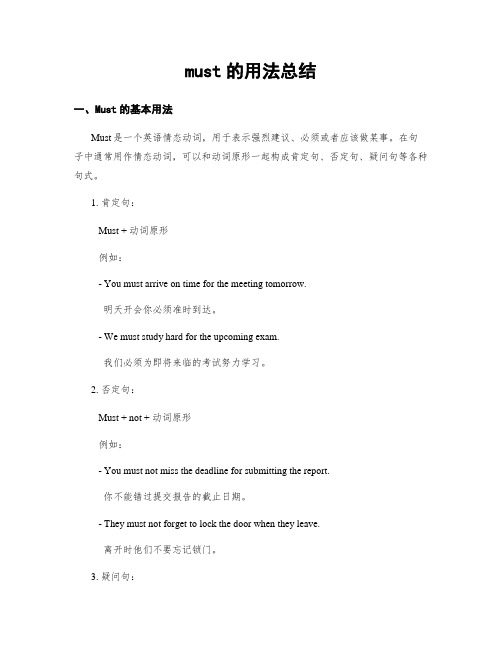
must的用法总结一、Must的基本用法Must是一个英语情态动词,用于表示强烈建议、必须或者应该做某事。
在句子中通常用作情态动词,可以和动词原形一起构成肯定句、否定句、疑问句等各种句式。
1. 肯定句:Must + 动词原形例如:- You must arrive on time for the meeting tomorrow.明天开会你必须准时到达。
- We must study hard for the upcoming exam.我们必须为即将来临的考试努力学习。
2. 否定句:Must + not + 动词原形例如:- You must not miss the deadline for submitting the report.你不能错过提交报告的截止日期。
- They must not forget to lock the door when they leave.离开时他们不要忘记锁门。
3. 疑问句:Must + 主语 + 动词原形?例如:- Must we finish this task by tomorrow?我们必须明天完成这项任务吗?- Must I bring my own laptop to the workshop?我必须带自己的笔记本电脑参加研讨会吗?二、Must的用法总结1. 表示根据道德规范或者法律规定必须做或者不做某事。
例如:- You must obey the rules of the library.你必须遵守图书馆的规定。
- Citizens must pay taxes on time.公民必须按时缴纳税款。
2. 表示根据逻辑、常识或者经验判断,某种行为是非常确凿的真理或者必然的结果。
例如:- The sun must rise in the east and set in the west.太阳肯定从东方升起,西方落下。
- You must be tired after working for such a long time.在工作了这么长时间之后,你一定累了。
must用法情态动词
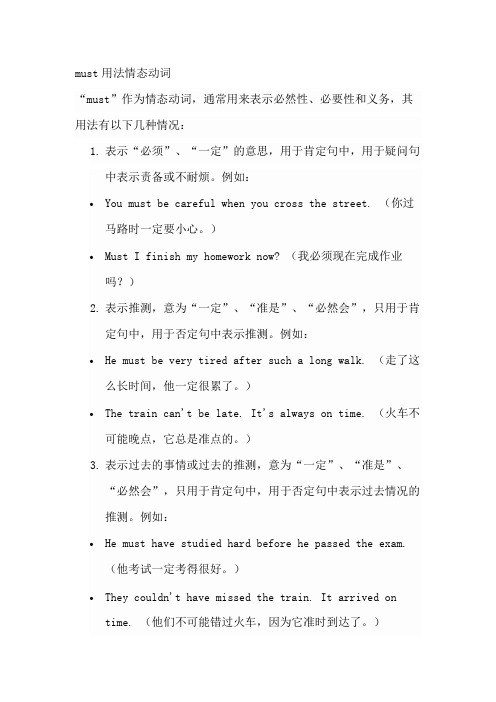
must用法情态动词“must”作为情态动词,通常用来表示必然性、必要性和义务,其用法有以下几种情况:1.表示“必须”、“一定”的意思,用于肯定句中,用于疑问句中表示责备或不耐烦。
例如:•You must be careful when you cross the street. (你过马路时一定要小心。
)•Must I finish my homework now? (我必须现在完成作业吗?)2.表示推测,意为“一定”、“准是”、“必然会”,只用于肯定句中,用于否定句中表示推测。
例如:•He must be very tired after such a long walk. (走了这么长时间,他一定很累了。
)•The train can't be late. It's always on time. (火车不可能晚点,它总是准点的。
)3.表示过去的事情或过去的推测,意为“一定”、“准是”、“必然会”,只用于肯定句中,用于否定句中表示过去情况的推测。
例如:•He must have studied hard before he passed the exam.(他考试一定考得很好。
)•They couldn't have missed the train. It arrived on time. (他们不可能错过火车,因为它准时到达了。
)4.表示强烈的建议或命令,意为“必须”、“一定要”,用于肯定句中,用于否定句中表示强烈的不满或抱怨。
例如:•You must come to see me before you leave. (你一定要在离开前来看我。
)•You mustn't forget to turn off the lights before you leave. (你千万不要忘记关灯。
)5.表示推测或可能性的程度,意为“大概”、“或许”、“极有可能”,用于肯定句中,用于否定句中表示不太可能的推测。
must的用法及短语

must的用法及短语一. must的用法1. must作为助动词,表示强烈的义务或需要,常用于肯定句中。
例如:- You must submit your assignment by Friday.(你必须在星期五前提交你的作业。
)- We must always follow the safety instructions.(我们必须始终遵守安全说明。
)2. must可以用于表示推测或断定某事是非常可能发生的。
例如:- It's midnight, and she's not home yet. She must be stuck in traffic.(现在已经半夜了,而她还没回家。
她一定被堵在交通堵塞里了。
)- He hasn't eaten anything all day. He must be starving.(他整天都没有吃东西。
他一定饿坏了。
)3. 在过去的时态中,must有两种形式:must和had to。
- must用于表达过去时态中主观的推测、肯定意愿或授权。
例:He said his parents and sister would visit him that day, so he knew he must clean his apartment.他说他父母和姐姐可能那天会来看望他,所以他知道自己得打扫公寓。
- had to用于表达过去时态中不由选择、不得不做某事。
例:I had no other option but to ride my bike to work when my car broke down.我的车坏了,我别无选择只能骑自行车上班。
二. must的常用短语1. must-see:必看的- The Grand Canyon is a must-see if you're ever in Arizona.(如果你曾经在亚利桑那州,大峡谷是必看的)- My friend recommended a must-see movie that just came out in theaters.(我的朋友推荐了一部最新上映并值得一看的电影。
must的用法及例句

must的用法及例句一、must的用法must是一个情态动词,用于表示强烈的义务、必要性和推断。
在英语中,我们常常使用must来表达对某事的肯定判断或假设。
下面将介绍must的用法,并给出一些例句以帮助理解。
1. 表示强制性的义务Must可以用来表达人们必须遵守或执行的法律、规则或规定。
它传达了一种强烈程度,并暗示没有其他选择。
例句:- You must wear a seatbelt while driving.你开车时必须系安全带。
- Students must complete their homework by tomorrow.学生们必须在明天之前完成作业。
2. 表示强烈推测或相当确定Must还可以用来表达对某事物非常有把握、认为几乎肯定会发生的推断。
例句:- The weather is so sunny. It must be a perfect day for a picnic.天气这么晴朗,很可能是个适合野餐的好日子。
- He has been studying all night long, so he must pass the exam.他整晚都在学习,所以他应该会通过考试。
3. 表示客观存在和真实性Must也可用于陈述某种客观现实、规律或普遍真理。
例句:- Water boils at 100 degrees Celsius. (Boiling point of water)水在摄氏100度时沸腾。
(水的沸点)- You must trust yourself before others can trust you.别人信任你之前,你必须要相信自己。
4. 表示对现在和过去发生的事物的猜测Must还可用于推测已经发生或正在发生的事情。
例句:- The door is wide open. Someone must have forgotten to close it.门敞开着,一定是有人忘记关上了。
- 1、下载文档前请自行甄别文档内容的完整性,平台不提供额外的编辑、内容补充、找答案等附加服务。
- 2、"仅部分预览"的文档,不可在线预览部分如存在完整性等问题,可反馈申请退款(可完整预览的文档不适用该条件!)。
- 3、如文档侵犯您的权益,请联系客服反馈,我们会尽快为您处理(人工客服工作时间:9:00-18:30)。
must用法详解
今天给大家带来must用法详解,我们一起来学习吧,下面就和大家分享,来欣赏一下吧。
must用法详解
1. 表示“必须”、“一定要”
(1) 可用于肯定句、否定句或疑问句;用于否定句时,mustn’t 的意思是“一定不要”、“不能”,而不是“不必”。
如:
You must finish it today. 你一定要在今天完成它。
You must see the doctor. 你一定要看医生。
Must you go so soon? 你一定得这么早就走吗?
We mustn’t think only of ourselves. 我们可不能只考虑自己。
(2) 主要表示现在或将来,但有时(如在间接引语中)也可表过去(=had to)。
如:
She asked if she must (had to) leave. 她问她是否一定要离开。
(3) 对于must 开头一般疑问句,若要作否定回答,可用needn’t、dont have to,不用mustn’t。
如:
"Must I come over tonight?" "No, you needn’t." “我今晚必须
过来吗?”“不必。
”
(4) 其后可接被动结构或进行形式。
如:
Something must be done to stop it. 必须采取措施来阻止它。
I think I must be going. 我想我得走了。
2. 表示推测
意为“准是”、“一定是”,注意以下几点。
如:
(1) 通常只用于肯定句,在否定句或疑问句用can 代之。
如:
It must be true. 那一定是真的。
比较。
如:Can it be true? 那可能是真的吗? / It can’t be true. 那不可能是真的。
(2) 后接动词原形,表示对现在情况的推测。
如:
He must be wrong. 他一定错了。
The man must have a lot of money. 这个人一定有不少钱。
【注】must 表示对现在情况的推测后接动词原形时,该动词通常为状态动词(如be, have, know 等),若为动作动词,通常要转换其他说法。
如要表示“他一定会赢”,通常不说He must win,可说He is sure to win。
(He must win的意思是“他必须要赢”)
(3) 其后可接进行式或完成进行式,用以谈论一个正在进行的动作。
如:
He must be writing a letter to his girl friend. 他一定在给他女朋友写信。
Someone must have been smoking here.一定有人一直在这里抽烟。
(4) 后接完成式,用来谈论已发生的情况。
如:
He must have arrived already.他一定已经到了。
I didn’t hear the phone. I must have been asleep. 我没有听到电话铃,我一定是睡着了。
3. 表示“应当”
相当于should, ought to的意思。
如:
You must say hello to her.你应当跟她打个招呼。
We must go and have a weekend there.我们应当到那里度周末。
4. 表示“偏偏”
有时表示不巧,有时表示固执,通常都是指令人不快的事。
如:
Must you make so much noise? 你就非得弄出这么大的声音吗?
Why must you always interrupt me? 你为什么硬是老要打断我?
We were ready to leave, but the baby must catch cold. 我们
刚准备好要走, 可孩子偏偏得了感冒。
Just when I was busy, the neighbor must come and chatter. 正当我忙碌的时候,邻居偏偏过来聊天。
关于"must"的这些用法,你“必须”知道!
must be\ must do 用于现在时
He keeps looking at you, he must like you.
他一直在看你,他一定是喜欢你吧
She looks so beautiful, she must be a model.
她好漂亮,她一定是模特吧
He has been working out for 5 years, he must be very strong.
他已经健身5年了,他一定特别强壮吧
2 must have been\ must have done用于过去时
He didnt show up last week, he must have been on vacation.
他上周一直没出现,他一定是去度假了
She must have been very excited, when her boyfriend proposed to her last night.
昨天晚上她男朋友向她求婚,她一定十分兴奋。
You got a 20% pay rise, you must have done a great job.
你的薪水涨了20%,你一定做得特别好吧!
You must wear a suit when you have a interview.
你面试的时候一定要穿西装
He must finish all his work before the meeting.
他必须要在会议前完成所有的工作
We must double confirm it before release.
我们一定要在发表前再次确认。
